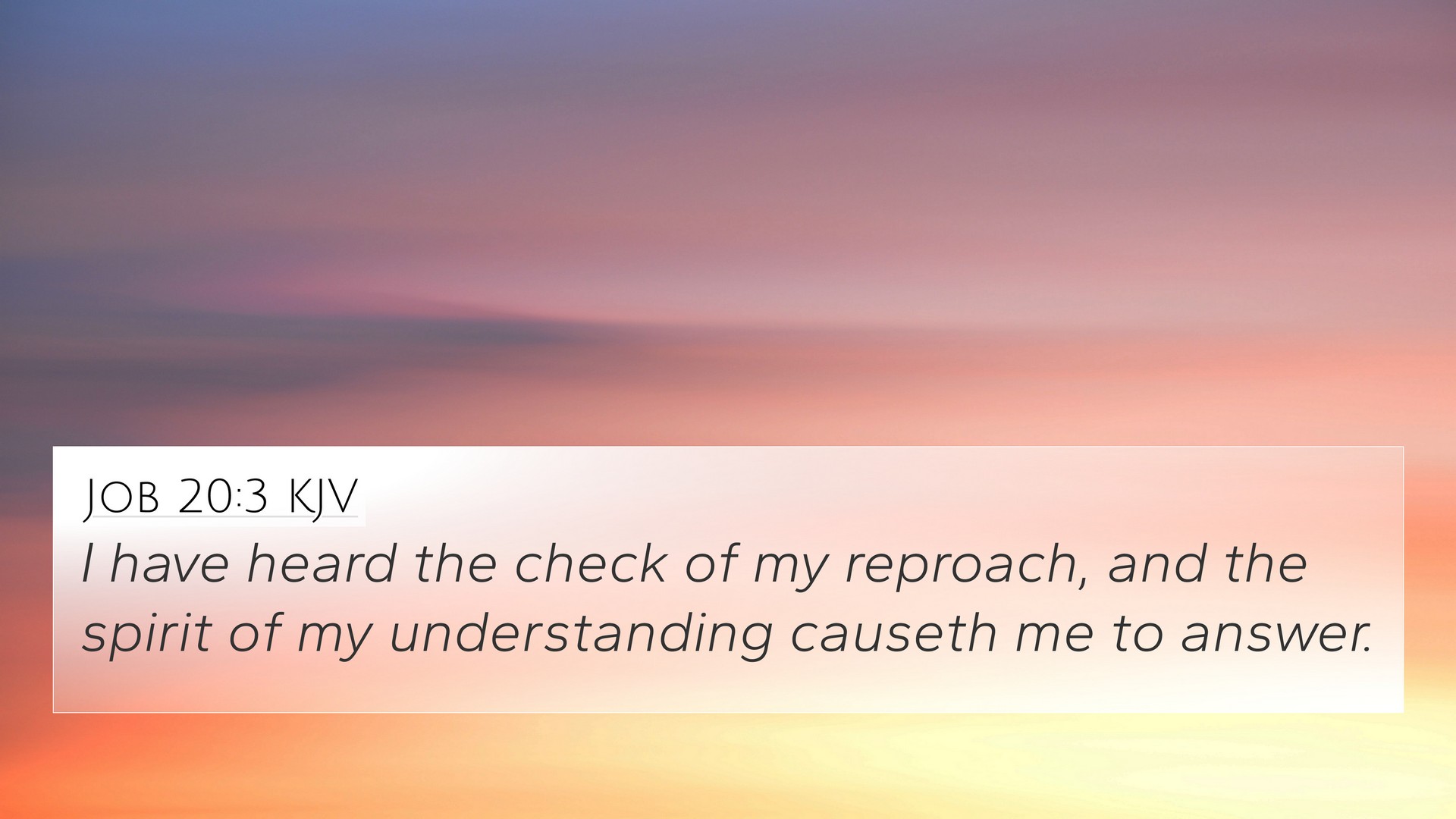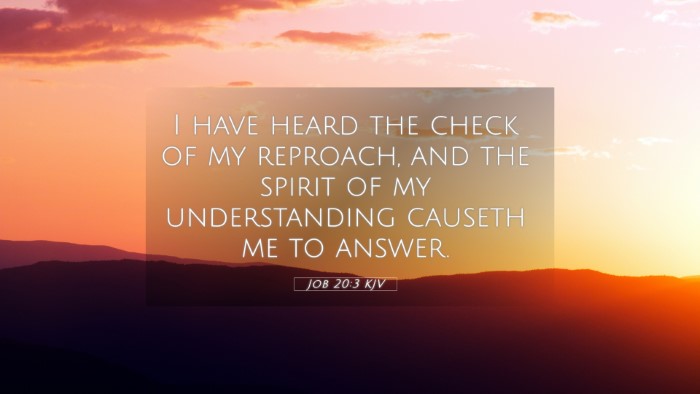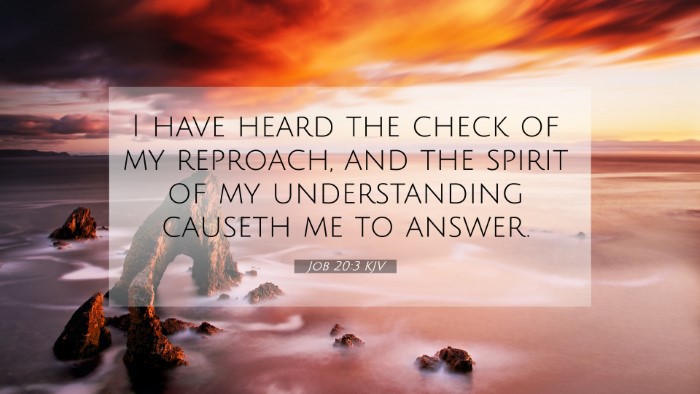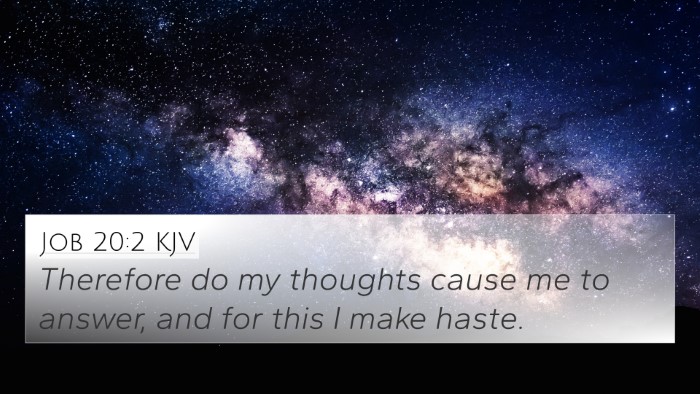Old Testament
Genesis Exodus Leviticus Numbers Deuteronomy Joshua Judges Ruth 1 Samuel 2 Samuel 1 Kings 2 Kings 1 Chronicles 2 Chronicles Ezra Nehemiah Esther Job Psalms Proverbs Ecclesiastes Song of Solomon Isaiah Jeremiah Lamentations Ezekiel Daniel Hosea Joel Amos Obadiah Jonah Micah Nahum Habakkuk Zephaniah Haggai Zechariah MalachiJob 20:3 Similar Verses
Job 20:3 Cross References
I have heard the check of my reproach, and the spirit of my understanding causeth me to answer.
Uncover the Rich Themes and Topics of This Bible Verse
Listed below are the Bible themes associated with Job 20:3. We invite you to explore each theme to gain deeper insights into the Scriptures.
Job 20:3 Cross Reference Verses
This section features a detailed cross-reference designed to enrich your understanding of the Scriptures. Below, you will find carefully selected verses that echo the themes and teachings related to Job 20:3 KJV. Click on any image to explore detailed analyses of related Bible verses and uncover deeper theological insights.
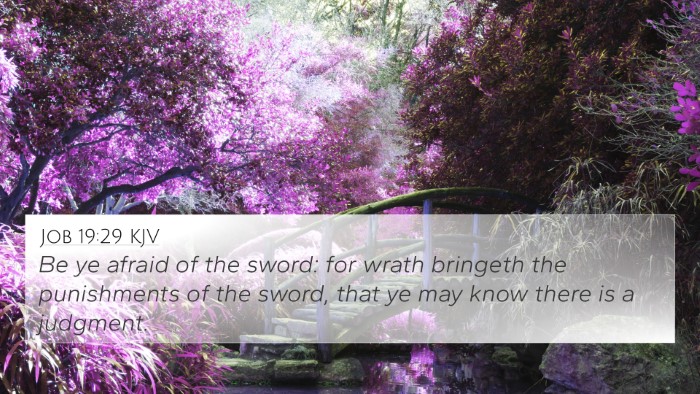
Job 19:29 (KJV) »
Be ye afraid of the sword: for wrath bringeth the punishments of the sword, that ye may know there is a judgment.

Job 19:3 (KJV) »
These ten times have ye reproached me: ye are not ashamed that ye make yourselves strange to me.

Job 33:3 (KJV) »
My words shall be of the uprightness of my heart: and my lips shall utter knowledge clearly.

Job 27:11 (KJV) »
I will teach you by the hand of God: that which is with the Almighty will I not conceal.
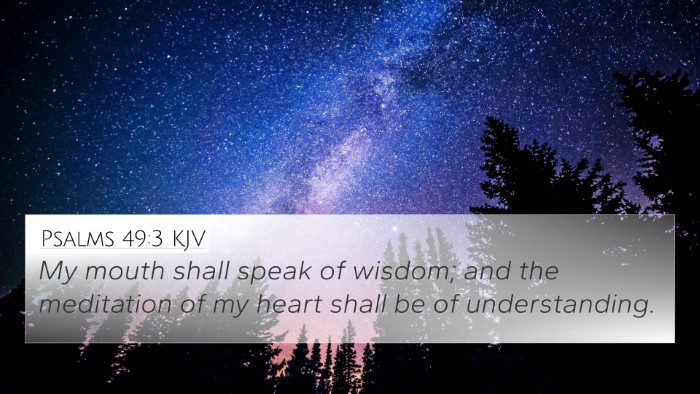
Psalms 49:3 (KJV) »
My mouth shall speak of wisdom; and the meditation of my heart shall be of understanding.
Job 20:3 Verse Analysis and Similar Verses
Understanding Job 20:3
Job 20:3 states: "I hear a message that gives me reason to be concerned." This verse, situated within the discourse of Zophar the Naamathite, implies a deeper conversation regarding the fate of the wicked and the justice meted out by God.
Overview of Job 20:3
The Book of Job presents a profound exploration of suffering, justice, and the human condition. Zophar, one of Job's friends, responds to Job's lament over his great suffering with a discourse emphasizing divine justice. The essence of Zophar's message in Job 20:3 highlights his determination to deliver a warning based on what he perceives as a divine truth regarding the fate of the wicked.
Insights from Public Domain Commentaries
Matthew Henry's Commentary
Matthew Henry emphasizes the urgency and seriousness of Zophar's words. He notes that the "message" signifies a divine revelation that brings forth concern. Henry points out that Zophar is motivated by a desire to communicate the inevitable judgment that awaits the unrepentant sinner. This perspective frames Zophar's remarks as not merely self-righteous, but rather as a reflection of his understanding of God's justice.
Albert Barnes' Commentary
Albert Barnes elaborates on how Zophar’s discourse is an attempt to convey the precarious position of the wicked. He highlights that the "message" is a warning that should resonate with anyone living in sin. Barnes points out that Zophar speaks not out of malice but out of a genuine concern for truth and the moral order as dictated by God. In this light, Job 20:3 serves as a reminder of the consequences that sin brings upon individuals.
Adam Clarke's Commentary
Adam Clarke offers another layer of interpretation by describing the message Zophar refers to as a spirit-led insight. Clarke interprets this revelation as Zophar feeling compelled to make the truth known to Job, framing it within the larger discussion of community and the shared understanding of divine justice among the friends. This adds a social dimension to the interpretation, emphasizing that Zophar's concern extends beyond Job to the moral landscape of their community.
Bible Verse Cross-References
- Psalm 37:10-11 - "For yet a little while, and the wicked shall not be; ye shall diligently consider his place, and it shall not be." - This verse emphasizes the temporary success of the wicked.
- Proverbs 11:21 - "Though hand join in hand, the wicked shall not be unpunished." - This reinforces the theme of divine justice.
- Job 4:8 - "Even as I have seen, they that plow iniquity, and sow wickedness, reap the same." - A parallel concept on the consequences of wickedness.
- Lamentations 3:34 - "To crush under his feet all the prisoners of the earth." - This suggests God’s authority over justice.
- Isaiah 3:11 - "Woe unto the wicked! it shall be ill with him: for the reward of his hands shall be given him." - Directly addresses the fate of the wicked.
- Matthew 7:13-14 - "Enter ye in at the strait gate; for wide is the gate, and broad is the way, that leadeth to destruction..." - Jarring contrast between paths leading to different ends.
- Galatians 6:7 - "Be not deceived; God is not mocked: for whatsoever a man soweth, that shall he also reap." - A powerful reiteration of the principle Zophar conveys.
- Revelation 21:8 - "But the fearful, and unbelieving, and the abominable, and murderers, and whoremongers, and sorcerers, and idolaters, and all liars, shall have their part in the lake which burneth with fire and brimstone..." - Clear depiction of judgment on the wicked.
- Romans 2:6-8 - "Who will render to every man according to his deeds: To them who by patient continuance in well doing seek for glory and honour and immortality, eternal life..." - This touches on both the righteous and the wicked.
- Proverbs 24:20 - "For there shall be no reward to the evil man; the candle of the wicked shall be put out." - A stark reminder of the fate facing those who do evil.
Connections Between Bible Verses
The themes that emerge from Job 20:3 are not confined to the Book of Job alone but resonate throughout Scripture. The emphasis on divine justice and the consequences of wicked behavior can be traced through Old and New Testament texts. Cross-referencing these verses elucidates a coherent biblical narrative about morality and accountability.
Comparative Bible Verse Analysis
The connections derived from these verses reveal a rich tapestry of God's judgment. Notably, Zophar’s warning aligns with the teachings found in the Psalms and Proverbs, where the moral order is emphasized across various contexts. The New Testament, particularly in Romans and Revelation, reinforces this compelling theme of ultimate accountability.
Conclusion
In examining Job 20:3 through the lenses of various commentators, we gain a multifaceted understanding of the text that underscores its significance within the broader context of Scripture. Zophar's message, while directed at Job, ultimately serves as a profound reminder of the eternal principles of justice that govern the moral universe.
Further Tools for Bible Cross-Referencing
For those studying the Bible and seeking to delve deeper into the themes found in Job 20:3, utilizing a Bible concordance or a Bible cross-reference guide can enhance your understanding. Methods of cross-referencing Bible study, such as identifying related themes and comparing different texts, can provide insights into the interconnectedness of Biblical themes.
Overall, Job 20:3 invites readers to reflect on their lives and the greater implications of divine justice as portrayed in the scriptures.
